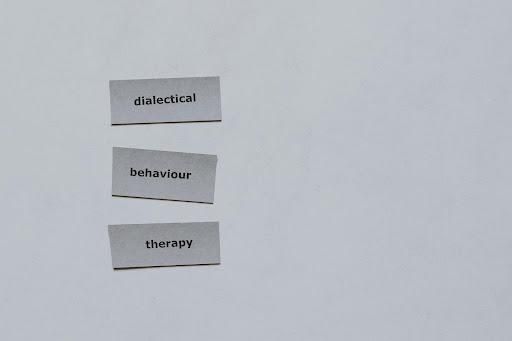Dialectical behaviour therapy (DBT) is a type of talking therapy that is used to help people who are suffering from mental illnesses. CBT, or cognitive behavioural therapy, is used in the treatment. This type of treatment assists patients in comprehending and accepting challenging emotions and thoughts.
What's the Difference Between Dialectical Behaviour Therapy and Cognitive Behavioural Therapy (CBT)?
The focus of cognitive-behavioural therapy is on how your thoughts, behaviour, and emotions interact. The goal of this treatment is to assist the patient in changing distracting thinking and behaviour patterns. DBT does the same thing, except it emphasises on accepting who you are rather than changing who you are.
DBT is used in treating a variety of conditions.
- Dialectical behavioural therapy was first created as a treatment for suicidal or borderline personality disorder patients.
- It has been altered over time for people with other mental health conditions that pose a risk to their safety or emotional well-being.
- Sudden emotional outbursts, excessive anger and hostility, and depression are common symptoms of DBT patients.
- Because the treatment was designed to help persons with suicidal ideation and borderline personality disorder, the majority of research on its effectiveness has focused on these two disorders.
- It is, however, reported to be useful in the treatment of drug and alcohol addictions, as well as eating disorders.
- This type of therapy works best for those who are willing to put in a lot of effort in therapy and even go above and above.
Some studies shows that DBT have indirect effects and cause impotence. In those cases, Cenforce 100, Cenforce 200, Vidalista 40, and Aurogra 100 can be used on a doctor’s prescription for the cure of this problem.
With DBT, you can improve your acceptance skills.
Accepting reality is a key component of DBT. Patients who seek this type of treatment frequently engage in destructive coping techniques such as self-harming, which only provide temporary relief from emotional suffering. Patients are urged to accept reality rather than fight their thoughts and feelings with DBT. The patient will be able to break the cycle of suffering, shame, and other negative feelings by acknowledging their history and present.
Is DBT Effective in the Treatment of Mental Illnesses?
DBT has been around for a while and has been proven to be very helpful. After one year of treatment, 75% of BPD (borderline personality disorder) patients no longer satisfied the diagnostic criteria for the disease, according to one study. Furthermore, patients with suicidal tendencies who combine DBT with skills training had better outcomes.
In more restricted studies, the therapy has proved to be effective in treating depression, anxiety, and PTSD in patients. DBT has also proven to be effective in the treatment of children with disruptive mood dysregulation disorder. However, studies on other illnesses are still lacking because the medication has primarily been utilised to treat BPD and suicidal patients.
What Makes Dialectical Behavioural Therapy So Special?
The term "dialectical" refers to the premise that combining two opposites in treatment — acceptance and transformation — yields better results than each one working alone.
The focus on acceptance of a patient's experience as a way for therapists to reassure them — and balance the effort needed to eliminate harmful behaviours — is one of DBT's distinguishing features.
The four sections of a standard comprehensive DBT are as follows:
- Individualised treatment
- Group skill development
- In case of a crisis between sessions, phone counselling to be done
- Health-care providers might join a consultation group to stay motivated and talk about patient care.
- Filling up daily "diary cards" to track progress is part of this.
DBT is used in treating a variety of conditions.
Dialectical behavioural therapy focuses on patients who are high-risk and difficult to cure. It has, however, been adapted for other mental health issues that jeopardise a person's safety, relationships, employment, and emotional well-being.
Patients may experience outbursts of rage and violence, mood swings, and a high sensitivity to rejection.
They have insecurity in the following areas:
- Moods\behaviour
- Self-image
- Thinking
- Relationships
Substance misuse, risky sex, self-injury, and recurring life problems, such as legal issues and homelessness, are all typical impulsive behaviours.
DBT has been endorsed by the American Psychiatric Association as an effective treatment for borderline personality disorder. Patients who get DBT have reported improvements in the following areas:
- Suicidal behaviour is less common and less severe.
- Hospitalizations are shorter.
- There is less rage.
- Treatment is less likely to be abandoned.
- Improved social interaction
- Borderline personality disorder is associated with a high rate of substance misuse.
- DBT has been shown to aid substance abusers with borderline personality disorder, but it hasn't been demonstrated to help with addiction on its own.
- According to several research, DBT may also help certain persons who are depressed. It may be recommended by your therapist or health care provider on its own or in combination with antidepressant medicines.
Furthermore, researchers are looking into whether DBT can help with the following conditions:
- Mood disturbances
- Consumption of excessive amounts of food
- ADHD
- Post-traumatic stress disorder (PTSD) is a type of anxiety condition
What Is DBT and How Does It Work?
DBT focuses on four different strategies to improve life skills:
Tolerance for extreme emotions such as anger without reacting impulsively or relieving suffering through self-injury or substance misuse.
Recognizing, classifying, and regulating emotions are all part of emotion control.
Mindfulness is the process of becoming more aware of oneself and others, as well as paying attention to the current moment.
Navigating conflict and behaving assertively are two aspects of interpersonal effectiveness.



















